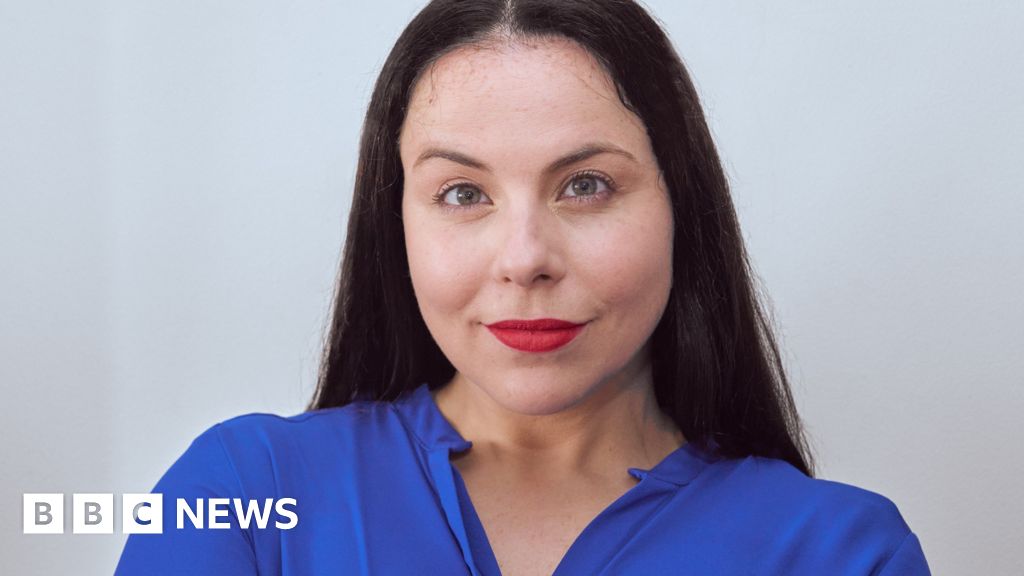Her grandfather drove trains to Auschwitz. My great-grandmother was killed there
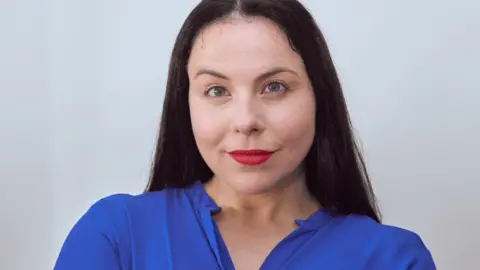 Amy Lebowitz
Amy LebowitzIt doesn’t matter how much you prepare. It still surprises you. As the granddaughter of a woman murdered in Auschwitz, I meet the granddaughter of a man who led Jews to their deaths. I’m lost for words.
I never met my grandfather Lovig, who survived the Holocaust, or his mother, Rachel. They were put on a cattle car to the Auschwitz death camp in 1944. Loevig, who was about 15 years old, was separated from his mother and sent to another inclusion camp. But Rachel was tortured, gassed, and killed.
I grew up hearing a lot of stories about it, and spending time with other Holocaust survivors in my family in Australia. They were at the forefront of my mind when I found myself in Germany interviewing Cornelia Stiller.
Cornelia’s grandfather was the main breadwinner in a family with little income. He originally worked as a coal miner, but after a near-fatal accident left him trapped under coal for two days, he decided to do something else. Things turned around when he eventually got a job at Deutsche Reichsen as a train driver. Cornelia’s mother used to speak of this achievement with pride, saying that getting the job was a “lifetime opportunity.”
Initially, it transported goods for the war effort. But it quickly turned into something more sinister. “I think my grandfather served as a train conductor, moving between death camps. He stayed in Lignitz, now Legnica, in a boarding school, so there was a certain separation from the family and from the death camps.”
Cornelia says that when her grandfather first started, he didn’t know what it would become. “I think my grandfather saw a lot of terrible things and I didn’t know how to get out of this business, he didn’t know how to deal with it.”
After training as a family therapist, she delved into her past and tried to understand it better. She told me that she began asking: “At what point was he the perpetrator? Was he an accessory to the perpetrators? When did he leave?”
At this point, my mouth is dry. My heart is racing. Listening to all this feels like an out of body experience. All I can think of is how her grandfather drove the trains to Auschwitz, and that’s how my grandmother and great-grandmother ended up there. I think of all my other relatives – cousins I knew existed but knew nothing about – who were also killed at Auschwitz.
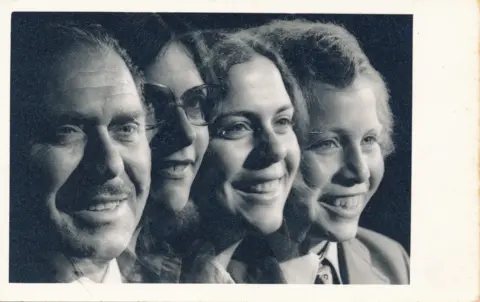 Lebowitz family
Lebowitz family“If I were younger, I think I would feel a strong hatred for you,” he told her as she fought back tears. “But I don’t because saying all those things must be really hard to admit.”
“Give me your hand,” Cornelia says. “It is important. Your tears, and your touch, touch me… My grandfather was a train conductor in Auschwitz. What can I say? Nothing.
She adds: “I can’t apologise, it’s not possible,” meaning the crime is very serious. “My grandfather felt very guilty, and he died in his guilt.” Cornelia thanks me for my openness and says there is a need to reveal the full history.
Then she says something you might not expect—that some Germans from Schnewald, where her family is from, have reacted angrily to her research. The Polish town now named Bojków, about 100 kilometers from Kraków, has a Nazi past.
Cornelia explains that originally, the city was against the ideology of the Nazi Party, but over time, it became consumed by it. Hitler saw Schönwald as a model village – an Aryan village in a land of Slavs. He hoped that the “fifth column” of ethnic Germans there would become a useful help in the army.
It was the site of the Gleiwitz Incident – a false flag incident organized by Nazi Germany in 1939 to justify the invasion of Poland, one of the triggers of World War II. And in 1945, towards the end of the war, it was the first German village to be attacked by advancing Soviet forces.
But just before that, it was the scene of one of the alleged death marches.
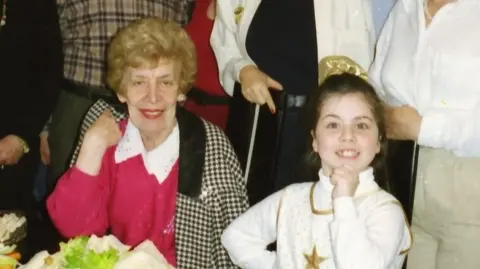 Lebowitz family
Lebowitz familyAs the Soviets approached Auschwitz, Hitler’s elite guard, the SS, forced some 60,000 prisoners there – most of them Jews – to move west. Between 19 and 21 January 1945, one of those marches passed through Schönwald. In below freezing temperatures, prisoners wore only their thin striped clothing with only wooden shoes on their feet. Those who collapsed from hunger and exhaustion were shot.
Those who survived were placed on open cattle wagon trains heading west, usually to other concentration camps, such as Buchenwald. The Nazis wanted to hold on to their slave labor – even at this point, some still believed in a final victory for the Third Reich.
My local history and religion teacher, Krzysztof Kruszynski, takes me to the main street where the death march passed. People wait to catch the bus outside the main church on Rolnikow Street – known as Bauer-Strasse in German times. Pointing to the ground, he tells me that these are the cobblestones that the prisoners had to walk on.
“It is a silent witness to the death march,” he says. “But the stone can’t talk.”
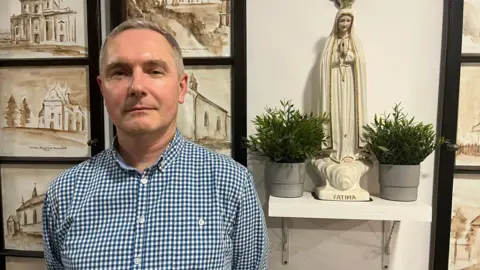 John Murphy
John MurphyThis history has been buried until now – partly because the Germans from Schnewald had to flee after the Soviet attack that came soon after and the village was resettled. One German woman, Ruta Kasubek, in her eighties, told me how drunken Soviet soldiers broke into her family’s home and killed her father. But there is another reason: active repression of the past.
It did not surprise me that some Germans responded negatively to Cornelia’s research. Germany is proud of it erinnerungskulturOr the culture of remembrance: compulsory Holocaust education, museums, memorials. But many see this as a function of the state and the government. And while they’re happy enough to confront the past in the abstract, it’s difficult to grapple with their family history, says Benjamin Fisher, a former Jewish student leader and former political consultant. He calls it “getting rid of history.”
A Study from Bielefeld University It found that a third of Germans believe their family members helped save Jews during the Holocaust. This is “absurd,” Benjamin says, and “statistically impossible.”
On the ground in Bojków, 80 years after the death march, things are changing. Last week, a delegation of Germans, Jews and Poles, including local authorities, schools and emergency services unveiled a new memorial commemorating those who died in the city’s death march.
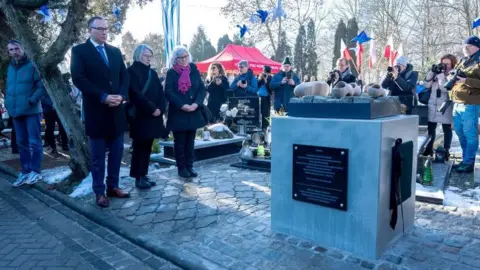 IPN K. łojko
IPN K. łojkoCornelia and Krzysztov were there. For Cornelia, history is deeply personal. She is convinced that studying and remembering is the key to understanding how society can change so quickly. And I’m grateful for that. Their work and passion give me hope in a world of growing anti-Semitism – as I try to keep the memory of how my family was murdered alive.
The people of Schönwald believed that their city lay at the pinnacle of high culture and spirituality. But then “folded in debauchery,” as Cornelia says. “This is a development that we need to understand…they are not just good or evil. People can go into jobs with good intentions but very quickly, [find themselves] On the wrong side.
“We can’t change the past. We can’t go back. But it’s important to talk about this, to remind people what happened, to remind people what human beings can do for each other.”
